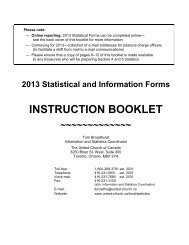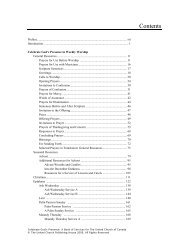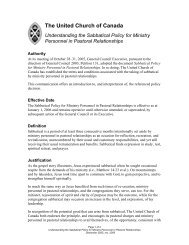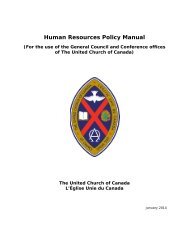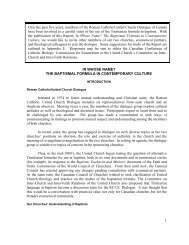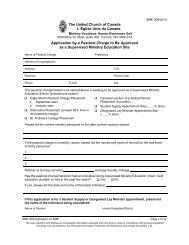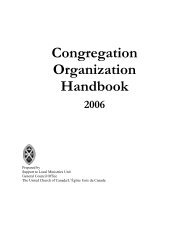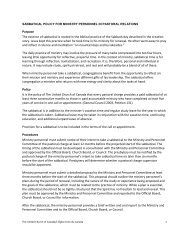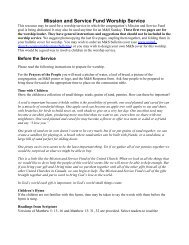Guidelines for Transition Teams - The United Church of Canada
Guidelines for Transition Teams - The United Church of Canada
Guidelines for Transition Teams - The United Church of Canada
You also want an ePaper? Increase the reach of your titles
YUMPU automatically turns print PDFs into web optimized ePapers that Google loves.
Appendix 10: Planning Effective<br />
Congregational Meetings<br />
An Interim Ministry usually includes several gatherings <strong>of</strong> the whole congregation. In planning the<br />
gatherings, consider the following:<br />
• Primary purpose: Establish the purpose, and then design the gathering to achieve it.<br />
Is this meeting meant to get in<strong>for</strong>mation? To share in<strong>for</strong>mation? To discuss? To gather ideas? To<br />
invite involvement? To learn something? To set priorities? To discern? To arrive at an agreement?<br />
To make a decision? What <strong>for</strong>mat best facilitates achieving the purpose?<br />
• Advance notice: Ensure that participants have what they need to participate fully.<br />
Who should be included? What kind <strong>of</strong> notice must be given? What in<strong>for</strong>mation should be<br />
provided ahead <strong>of</strong> time? How, and how soon?<br />
• Leadership: Provide suitable and trained leadership.<br />
What type <strong>of</strong> leadership is needed: Facilitators? Discussion leaders? A chair? A panel? What<br />
exactly do you expect <strong>of</strong> the leaders? How can they be helped to be effective: A training session?<br />
A prepared script? A simulated rehearsal?<br />
• Technical and logistical details: Make sure all equipment is in place and working.<br />
What technical aids are needed: Overheads? Projector? Screens? Computer? Microphones?<br />
Recording equipment? Who will ensure it is set up and working? Who will oversee its proper<br />
operation during the event?<br />
• Respect participants’ needs: Start and end on time; explain what will happen.<br />
Who will chair? Is a printed agenda required? Who needs to be introduced? What is the expected<br />
length, and who will keep time? Are refreshments needed?<br />
• Discussion management: Ensure safety and ease <strong>for</strong> people to speak.<br />
What will help people speak up? Are guidelines needed? Are microphones needed? What<br />
obstacles, arguments, or dissent might be expected? How can it be dealt with? What time limits<br />
are necessary?<br />
• Recording: Prepare <strong>for</strong> documenting the outcomes.<br />
How will outcomes be recorded? Who will take notes? Are <strong>for</strong>ms needed? How will the responses<br />
be compiled? By whom? When?<br />
• Dissemination: Plan how the outcomes will be communicated.<br />
How will the results be shared? Other than those attending, who needs to know the outcomes<br />
<strong>of</strong> the gathering? How soon?<br />
• Debriefing and evaluation: Take time to learn from the experience.<br />
Who should be involved in sharing perceptions and observations, and evaluating how effectively<br />
the purposes <strong>of</strong> the meeting were met? When? How will the in<strong>for</strong>mation be shared and with<br />
whom?<br />
54 <strong>Guidelines</strong> <strong>for</strong> <strong>Transition</strong> <strong>Teams</strong>



